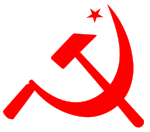More languages
More actions
Communist Party of India (Marxist) भारतीय कम्युनिस्ट पार्टी (मार्क्सवादी) | |
|---|---|
 | |
| Abbreviation | CPI(M) |
| General Secretary | Vacant |
| Founded | 7 November 1964 |
| Newspaper | People's Democracy • Ganashakti • Deshabhimani • Loklaher • Desher Katha • Prajashakti • Marxist • Theekkathir |
| Student wing | Students' Federation of India (4 million members) |
| Youth wing | Democractic Youth Federation of India |
| Women's wing | All-India Democratic Women's Association |
| Political orientation | Scientific socialism |
| Website | |
| https://cpim.org/ | |
The Communist Party of India (Marxist) (CPI(M)) is the largest of the several communist parties in India with over a million members in 2018 along with many more in its front organizations, having held power at state governments in West Bengal, Kerala and Tripura along with being a party of nationwide repute. In its constitution, it calls itself a revolutionary party guided by the principles of Marxism-Leninism.[1]
History[edit | edit source]
Predecessors[edit | edit source]
The undivided Communist Party of India was founded by a small group of Indian revolutionaries in exile in Tashkent in 1920, who were inspired by the ideas of the Russian Revolution. In its formative years, the party withstood the brunt of British repression with a number of conspiracy cases hurled against them in Peshawar (1922), Meerut (1923) and Kanpur (1929). A number of revolts against the colonial government were either led or inspired by the communists - the Punappra Vayalar rebellion, the North Malabar rising, the Tebhaga movement, the Warli adivasi revolt and the historic Telangana struggle.[2]
The CPI came to power in the state government of Kerala for the first time in 1957. Due to the social changes brought by the Left Front government, the Centre imposed President's rule upon the state in 1959.
Split from CPI[edit | edit source]
The Communist Party of India (Marxist) was formed in 1964 as a result of a prolonged struggle against Khruschevite revisionism and Maoist dogmatism.[3] The CPI(M) said it could learn very little from the Russian and Chinese revolutions and believed an Indian revolution would be very different from previous communist revolutions.[4] The CPI(M) led Left Front won the electorate over West Bengal in 1974, after which over three decades of Left Front rule were to follow.
| Part of a series on |
| Communist parties |
|---|
References[edit | edit source]
- ↑ https://cpim.org/party-constitution
- ↑ https://www.revolutionarydemocracy.org/archive/Telangana.pdf
- ↑ https://cpim.org/party-programme
- ↑ Vijay Prashad (2017). Red Star over the Third World: 'Polycentric Communism' (p. 118). [PDF] New Delhi: LeftWord Books.
